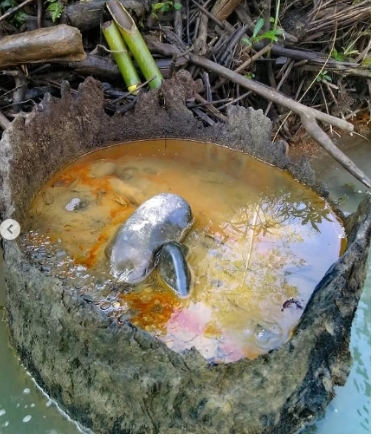The Noctes and Their Unique Salt-Making Tradition: (The treasure of Nocte: Saltwater well Tirap)
The Noctes, an indigenous community from the eastern part of Arunachal Pradesh, specifically the Tirap district, are blessed with a rich cultural heritage and abundant natural resources. Among these treasures, one of the most remarkable is their traditional salt, known as “suum” in the Nocte dialect. This salt is not only vital to the Noctes but has also been a crucial element for mankind throughout history. Unlike sea salt derived from ocean water, the Nocte salt is uniquely sourced from underground.
Discovery of Saltwater Springs and Traditional Extraction
In ancient times, the Noctes discovered natural saltwater springs hidden beneath the earth. To access this precious resource, they dug wells near these salty water sources and lined them with tree bark to prevent contamination. The saltwater, fetched in bamboo pots called “jotho“, was integral to daily life, used in cooking and other essential activities. However, the true craftsmanship lay in the process of combustion evaporation, or “suumkoak“, a meticulous technique passed down through generations.
The Sacred Art of Salt-Making
The art of salt-making was a revered practice, reserved for skilled individuals who performed rituals, prayers, and offerings to honor the Goddess of Salt, known as “Sumtei-Wangcha” in Nocte tradition. The sacred sites where the salt was found, called “suum poong”, were located in specific lower Nocte villages like Thingdong (Kaimai), Sala (Bordurria), Longchaang (Paniduria), Thingnyan (Namsang), and a few areas in Phothung (Subang).
Nocte Salt in Trade and Barter System
This evaporated salt was not just a household staple; it played a pivotal role in trade. The Noctes engaged in barter exchanges with Assamese traders at a place called “Kaantuli” (now Kantulia), a riverine hub between present-day Wasathong and Laptang villages. Assamese merchants would bring goods such as sugar, jam, rice, ornaments, and other commodities in exchange for the Nocte salt. The communication for these exchanges was uniquely ingenious—messages were sent through rivers using bamboo illustrations to fix barter dates.
ecline of the Traditional Practice
Sadly, this once-flourishing tradition has waned over time, as people moved towards mass-produced salts and more convenient lifestyles, forsaking the heritage and methods of their forefathers. Yet, the memories of this ancient craft remain a source of pride and hope for revival.
The Need for Preservation and Revival
It is essential to acknowledge and preserve such extraordinary traditions, which not only highlight sustainable living but also honor the wisdom of our ancestors. The Noctes’ salt-making legacy stands as a testament to the harmony between nature and culture, urging us to rediscover and embrace the blessings bestowed upon us by both the Almighty and our forebears. One day, we may rekindle this masterpiece of heritage and proudly carry it forward for future generations.
Modern Accessibility and Government Support
In today’s social media era, we can easily explore and access important sites with the help of vehicles, making them more accessible for public benefit. The saltwater wells in Tirap district of Arunachal Pradesh have recently gained recognition. The state government should prioritize and encourage locals to preserve the traditional extraction process, as practiced in ancient times. Additionally, consuming locally sourced salt is far more beneficial than chemically processed alternatives.
Promoting Health and Sustainable Practices
Now, we have a great opportunity to safeguard our valuable natural resources, such as saltwater wells, which provide a healthier option compared to market salt, as they have no harmful side effects. With health becoming a top priority for today’s generation, this is the right time to promote these natural resources.
Encouraging Awareness and Community Initiatives
It is encouraging to learn that government officials, media representatives, ministers, locals, and public leaders recently visited Nimok Puung (Saltwater Well) in Subang village to raise awareness and explore its potential benefits. This is the perfect time to support such initiatives, preserve our traditional organic food practices, and wholeheartedly embrace this natural and sustainable resource.
